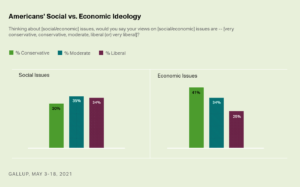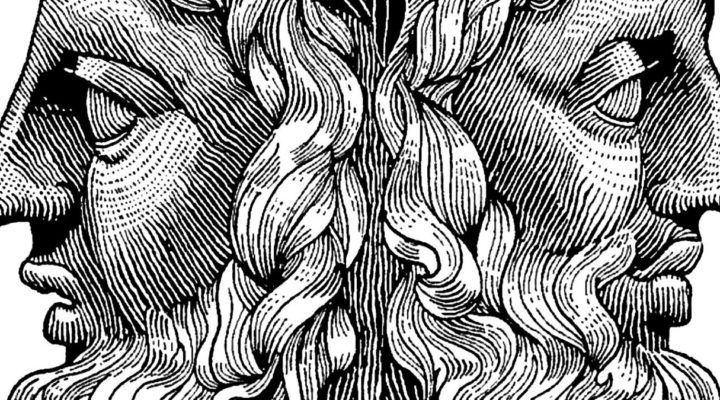More Americans describe themselves as socially liberal than economically liberal, according to new polling data from Gallup.
And for the first time, more Americans identify as social liberals than as social conservatives.
“This is the first year in Gallup’s trend since 2001 that more Americans have identified as liberal than as conservative on social issues,” Gallup reported. “Although the four-percentage-point gap is not statistically significant, it represents a numeric milestone in the trend, which has seen Americans’ social views becoming more liberal over the past decade.”
Taken together, that means two-thirds of Americans do not classify themselves as social conservatives.
For the entire first decade of the 21st century, Gallup documented an average 12-point advantage for social conservatives over social liberals. Thus the current four-point gap the other direction is notable.
About the same percentage of Americans identify as social moderates (35%) as social liberals (34%). Taken together, that means two-thirds of Americans do not classify themselves as social conservatives.
Previous polling by Pew Research Center has found that about 25% of Americans identify as evangelical Christians, while another 21% identify as Catholics. Those two religious groups often account for the base of social conservativism in America, yet the new Gallup data imply that not all evangelicals and Catholics consider themselves social conservatives.
 When it comes to economics, however, conservatives retain a distinct advantage.
When it comes to economics, however, conservatives retain a distinct advantage.
Gallup found 41% of Americans identify as economic conservatives, considerably more than the 25% who identify as economic liberals. Again, about a third of Americans (34%) say they are economic moderates.
“Economic conservatives’ lead over liberals has narrowed since 2019 as more Americans have identified as economically liberal, rising from 18% in 2019 to 25% today,” Gallup explained. “However, conservatives have held steady at about 40% while moderates have declined slightly.”
The new data comes from Gallup’s annual Values and Beliefs poll, conducted May 3-18.
Among other interpretive points made by Gallup in reporting the results:
- Democrats are driving the decline in social conservatism. “The decline in net conservatism on social issues over the past decade is mostly due to fewer Democrats identifying as socially conservative at the same time that Republicans’ and independents’ descriptions of their social views have stayed the same.”
- Social conservatism is waning among college graduates. “Net conservativism has declined among college graduates at the same time it has stayed fairly even among those without a college degree. From 2001 to 2012, college graduates were generally divided in their views on social issues, with the net conservative figure hovering near the zero midpoint. Since then, the index has fallen into decidedly negative territory among college graduates, indicating that more identify as socially liberal than conservative.”
- Racial differences persist. “To varying degrees, white Americans have generally been more conservative than non-white Americans on social as well as economic issues since 2001, a pattern that is consistent with Americans’ partisan leanings. Still, both racial groups have become less conservative on social issues over time, with roughly equal declines among white and non-white Americans.”
- Age differences are growing. “Young and middle-aged adults have grown less conservative over time on both types of issues, while there has been less change among older adults.” For examples, adults aged 18 to 34 have shifted from being about equally split on social views in the early 2000s to being decidedly more liberal today.
Gallup’s bottom-line interpretation of the new data suggests attempts at bipartisanship or cultural cooperation are more likely to be found in economic policy than in social issues.
“Americans are far from unified when it comes to economic or social issues, broadly speaking,” the report said. “Of the two, however, economic issues offer more promise for finding common ground given Americans’ center-right leanings, in contrast with their highly fractured outlook on social issues.”


